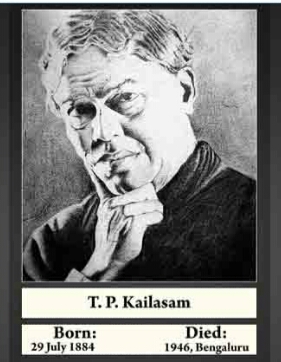This Blog-post is a response to the thinking activity on The Curse of Karna given by our professor madam Miss. Yesha Bhatt.
- About the Author:
Tyagraj Paramasiva Iyer Kailasam known as his short name T.P. Kailasam was a very prominent Kannad writer. Widely known as a playwright. He earned the title Prahasana Prapitamaha, "the father of humorous plays" and later he was also called "Kannadakke Obbane Kailasam" meaning "One and Only Kailasam for Kannada". The Curse of Karna is one of his myth-fictional severe plays.
- Interpret the 'end' of all Acts and scenes:
The play is divided into five Acts. Every act (instead of the last act) is ended with one sentence, "POOR KARNA! POOR, POOR KARNA!" by different people to Karna. Putting only one line through other people or after the dialogue of Karna himself. It might show Karna's poor condition to be Suta's son. Although, after becoming the king of the Anga region, still this line is deliberately put by the author. Maybe because the concern of the text is might be about the Identity of Karna. Here I put all the last lines in every act,
ACT: I
Karna:
God bless you for your kindness, Gurujee!
(Walks to the path in the foreground; shoulders
his belongings and walking along the path,
fades out of sight. Raama, sighing deeply,
watches the departing pupil with wistful eyes
. . mumbling to himself )
POOR KARNA! POOR, POOR KARNA!
The Curtain Drops Slowly!
ACT: II
Anga
Come, come Anga! What made thee hold
[thy hand
From slaying yonder human hog? You lost
The very surest chance of ending life
Of our Crowned Prince’s direst foe!?
(with eyes welling with tears of anger and
impotent agony)
It is a curse, my lord of Gaandhaara,
That robb’d mine arms and trunk of strength and life:
A mighty brahmin’s potent curse that rules:
Whensoe’er my lowly birth is flung at me,
And made to cross my mind, my brain
[refuses thought !
My heart refuses beat ! Mine arms remaininert !
Pray pity me, my lord, a helpless, hapless
[victim of
A BRAHMIN’S CURSE!
(Collapses into Gaandhaara’s arms. Gaandhaara gathers him in his arms and _ half
carries him out, muttering tearfully)
POOR ANGA! POOR POOR HONEST ANGA!
The Curtain Drops Slowly !
ACT:III
The king catches him from falling and
gathering him up in his arms, carries him
out—muttering *neath his breath)
The King POOR ANGA! OUR POOR GREAT ANGA !
The Curtain Drops Slowly !
ACT:IV
(Anga crumples into Bheema’s arms who
carries him out muttering amid tears: POOR
ANGA! POOR GREAT ANGA!” The
THRONE ROOM, empty now, is exposed for
a minute before—)
The Curtain Drops Slowly!
ACT:V
(Anga’s head drops and he falls back DEAD
Aswattha and Maadra bury their heart-bursting
sobs in the bosom of the Dead Marshal Anga
whimpering)
“OUR ANGA!” “OUR GREAT ANGA!”
(“OUR POOR POOR ANGA”!
The Curtain Drops Slowly!
Here, in the last act, "OUR" determiner is added which shows the tragedy of Karna. This tragedy is followed from the first act by using the word "Poor".
- Moral conflict' and 'Hamartia' in Karna's Character:
As we know, Karna's character is narrated as 'Danveer', though after becoming the king, his moral value of Charity remains the same. As in mythology, there is the narration that to save his son Arjuna, Indra comes in brahmin's disguise and begs the Kavach and Kundals who were the protection of Karna's life. So we can assume that Karna's character himself leads him toward downfall or on the dark side because of this Moral conflict. Karna was killed by his little brother Arjuna but unknowingly. Which leads tragic flow towards his death.
- Karna - The voice of Subaltern:
In the play and the mythology, the narration about Karna's cast is very much famous. Karna was an illegitimate son of Lord Sun and Kunti through Mantra. Because she gave birth before marriage, she places him in a wooden box and slides away in the ever, later on, found by a charioteer's wife Radha, who takes the baby Karna to her husband Adhiratha Nandana.
Karna was raised by the Sutas. So he questioned his identity and what his Guru Parshuram said was that he did not teach Sut Putra. But ultimate the voice of Karna as Subaltern is not actually in favor of his giving identity but as we can see that he will die during the war so the voice of subaltern is dead, it is raised but the result is that subalterns are dying with their raising voice against the identity or their position in the society with no any clear justification.




No comments:
Post a Comment